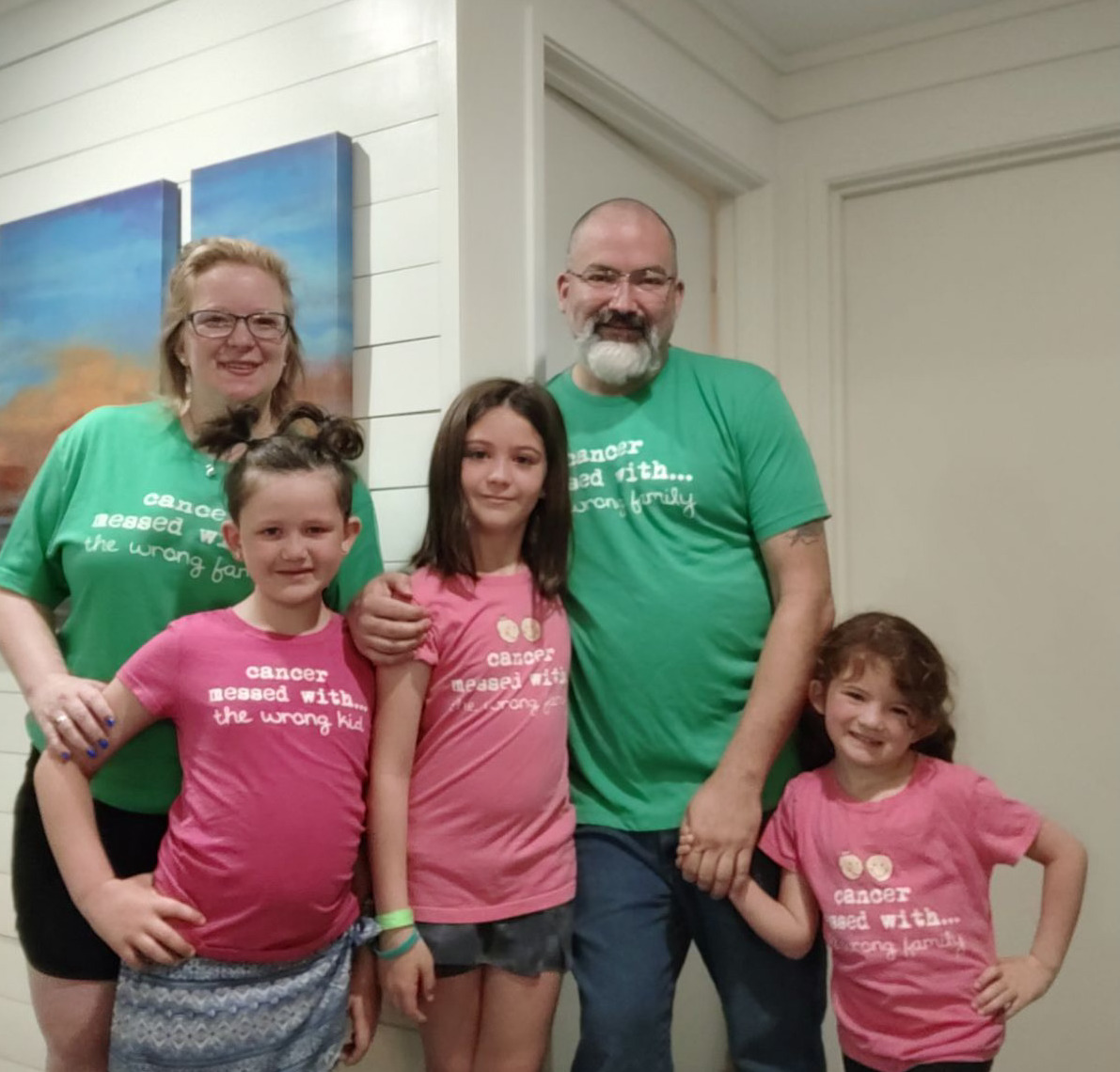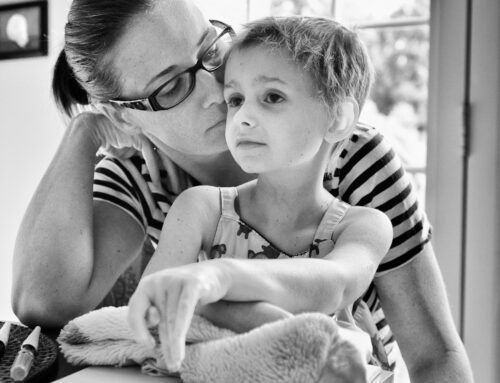
The Stories of Fighters: How to support families with cancer from the perspective of a cancer mom
For this September’s Childhood Cancer Awareness Month we recognize that cancer is a battle, but it’s a fight that no child should have to fight alone. Follow along this month as we feature the Stories of Fighters.
Each donation means more research poured into finding advanced treatment options. Be a fighter in your own way this month by donating to the cause, or fundraising for us on Facebook. Together we can produce real change in the lives of these cancer fighters.
“Do your little but of good where you are; it is those little bits of good put together that overwhelm the world.” – Desmond Tutu

As you may know, cancer affects not only the patient but the entire family. It can be tricky to navigate how to best offer your support, though that should not stop us from learning what we can do. Which is why we sat down with a mom who has a child with cancer and asked her how someone can best support a cancer family in need. Here is what she said.
Meet the Family
The D’Autorios are a family of five. Skyla D’Autorio is a passionate and caring mom to three children, and wife to a selfless husband. In 2018, the middle sister, Trinity was diagnosed with Neuroblastoma. At only 7 years old she has fought cancer, conquered cancer, relapsed into another cancer diagnosis, and has been fighting ever since.  Because Trinity has had cancer off and on for five years now, it’s become the most prevalent reality of life for her two sisters. “Cancer is their world,” as Skyla put it. Though this may be the case, it does not deter the family from supporting one another. Skyla explained that every person in the family has a role. For the sisters, “They are buddies and super protective of each other.” They frequently have to make sacrifices for the greater good. Her husband works every day without skipping a beat in order to provide for their family, often missing out on shared experiences. As for Skyla, there is little time for herself. She is on call 24/7, driving to treatments, making tough decisions, and looking after three little girls. Despite this, she spoke with hope and a fight in her voice. Pediatric cancer families are truly warriors but, “they are struggling” (Skyla D’Autorio). Here is what you can do that will be most helpful to families in need.
Because Trinity has had cancer off and on for five years now, it’s become the most prevalent reality of life for her two sisters. “Cancer is their world,” as Skyla put it. Though this may be the case, it does not deter the family from supporting one another. Skyla explained that every person in the family has a role. For the sisters, “They are buddies and super protective of each other.” They frequently have to make sacrifices for the greater good. Her husband works every day without skipping a beat in order to provide for their family, often missing out on shared experiences. As for Skyla, there is little time for herself. She is on call 24/7, driving to treatments, making tough decisions, and looking after three little girls. Despite this, she spoke with hope and a fight in her voice. Pediatric cancer families are truly warriors but, “they are struggling” (Skyla D’Autorio). Here is what you can do that will be most helpful to families in need.
Toys are great. But financial support is even greater.
Support through large financial means.
As Skyla mentioned, toys are often gifted to children with cancer and their families. Although it’s nice for the children to receive such gifts, cancer takes a huge toll on the wallet making financial support a significant need. If the relationship is built for such contributions, consider providing support for large financial expenses such as schooling, hotel rooms, and travel expenses. To help with these large financial expenses, The Isabella Santos Foundation has a Live My Dreams program where 10% of donations are directed to providing families with these needed expenses when possible.
The cost of necessities adds up. Purchase the small, overlooked, but necessary items.
If it’s not in the budget to support someone through large financial assistance, there are still ways to help with expenses. The little things are not so little such as buying the family’s groceries, dinner, or even coffee when you can. Some caretakers with children with cancer may have an Amazon wishlist that has those items they need the most.
Donate to orgs. that offer assistance for families.
If you are looking for an indirect approach to supporting families in need, then you can still do so by donating money to organizations like the Isabella Santos Foundation. ISF supports families dealing with a child with cancer in a plethora of ways. When donating to ISF, your money is going towards three wishes, to “Beat Cancer”, “Grow Hair”, and “Live My Dreams”. ISF focuses on supporting families in addition to funding research for rare pediatric cancers. The goal is to increase the survival rate of these rare cancers so no parent has to worry if their child will live.
Emotional support can go a long way.
Support the “silent fighters”
Typically people see those who are caring for the child or cancer patient and can see all the work they must do – the exhausting day-to-day of being a caretaker.
However, it’s only possible for caretakers to be fully invested when they have their needs at home being met through these “silent fighters.” A typical normalcy in the oncology world is for the mother to be the caretaker, and the father to be at work to provide financial support. It can be an isolating experience for these fathers since there is little emotional support for them, as Skyla explains.
Don’t overlook the “silent fighters!” Consider providing individual support for the money-makers by taking them out once and while to offer a get-a-away and a place to talk. You may also offer to babysit so that both parties can get some time away to work on their relationships.
Get into the “trenches”, no matter how long the fight has been fought.
Cancer is a ruthless and persistent disease, especially for childhood cancer. It’s not uncommon that children relapse if they have gone into remission, or they simply have been in the struggle for years. One of the most impactful ways to support someone is to stick with them even when it’s been some time. Remind them that you are there for them. Offer a helping hand. Check on them continuously. “Not everyone has a support system so never assume that they are already being helped” (Skyla D’Autorio).
Decisions are exhausting. Don’t wait to help.
In order to avoid stepping on toes or offending someone, it can be easier to offer help and wait for the other person to reach out if they want to or need to. However, cancer requires intense emotional strain and constant difficult decisions. It requires someone’s mental capacity to be solely dedicated to fighting cancer, leaving other decisions too tiring. Sometimes, the best act of service you can do for someone dealing with cancer is to unobtrusively help without asking. For example, you can randomly venmo them money or give them a Chick-Fil-A gift card (Skyla and Trinity’s favorite after-treatment meal).
When reminiscing on times Skyla felt most supported by others, she explained how her friend offered to drive her girls to a summer camp two hours away, every day so that they could have a memorable experience. It also allowed Skyla and her husband time alone. Now it’s become a summer tradition that the family can look forward to, which otherwise wouldn’t have been possible if it was not for her friend’s consistent support in an area that can go overlooked.
Think of the basics, never assume one already has support, show up consistently, and you will be sure to mean the world to families dealing with cancer.
Want to start supporting families?
Make a donation to ISF to help increase the survival rate and provide support for families.




